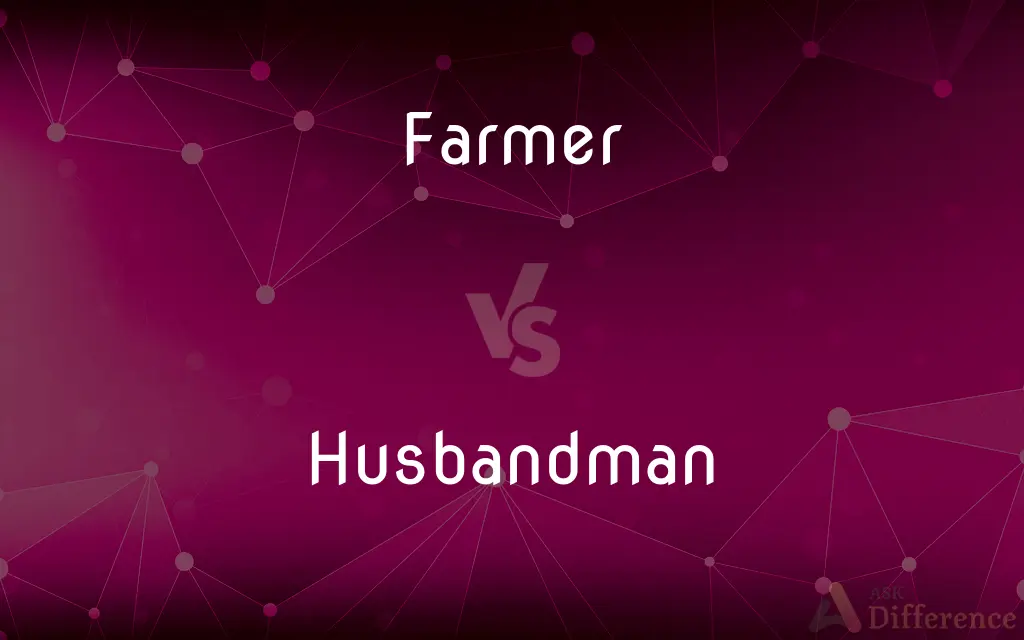Farmer vs. Husbandman — What's the Difference?
By Urooj Arif & Maham Liaqat — Updated on April 9, 2024
A farmer is broadly involved in agriculture, raising crops and livestock, while a husbandman focuses more on the cultivation of crops and land management.

Difference Between Farmer and Husbandman
Table of Contents
ADVERTISEMENT
Key Differences
A farmer engages in the broader scope of agriculture, which can include crop production, livestock raising, and dairy farming, aiming for large-scale production and commercial success. On the other hand, a husbandman traditionally refers to someone who cultivates the land, focusing on the art and science of plant growth, often on a smaller scale and sometimes with a more personal or sustainable approach.
The term "farmer" is widely used today and is synonymous with individuals working within the agricultural sector, regardless of the size of their operation or the specifics of their work. A husbandman, while less commonly used in contemporary language, evokes an image of someone deeply connected to the cultivation of land, perhaps emphasizing a more holistic or environmentally conscious farming practice.
Farmers may utilize a variety of modern agricultural techniques, machinery, and technology to optimize production and efficiency. This can include everything from GPS-guided tractors to automated milking machines. Husbandmen, while they may also employ modern techniques, are often associated with traditional farming practices, focusing on soil health, crop rotation, and sustainable agriculture.
In terms of economic impact, farmers contribute significantly to the agricultural output of a country, producing food, fiber, and other products on a commercial scale. Husbandmen, though their operations might be smaller, play a crucial role in preserving biodiversity, traditional agricultural practices, and contributing to local food systems.
Despite the differences, both farmers and husbandmen share a common goal: to produce food and other agricultural products. They both must possess a deep understanding of the land, weather patterns, and agricultural practices to be successful. However, the scale, methods, and sometimes the philosophy behind their work can differ significantly.
ADVERTISEMENT
Comparison Chart
Definition
An individual engaged in agriculture, raising crops and livestock.
Focuses on the cultivation of crops and land management.
Scope
Broad, including crop production, livestock, and dairy farming.
More focused on crop cultivation and sustainable land management.
Techniques
Utilizes modern agricultural techniques and machinery.
Often associated with traditional and sustainable farming practices.
Economic Impact
Contributes to large-scale agricultural output.
Plays a role in preserving biodiversity and local food systems.
Goal
Producing food and agricultural products on a commercial scale.
Focused on sustainable production and often smaller scale operations.
Compare with Definitions
Farmer
Employs modern technologies for efficiency and production.
Using drones, the farmer could monitor crop health over large areas.
Husbandman
Primarily focuses on crop cultivation and managing land sustainably.
The husbandman carefully selected heirloom seeds for planting.
Farmer
Engages broadly in agriculture, including livestock and crop production.
The farmer invested in new irrigation systems to improve crop yields.
Husbandman
Utilizes traditional methods alongside sustainable innovations.
Employing no-till farming, the husbandman worked to preserve soil structure.
Farmer
Significant contributor to the national and global food supply.
The farmer's cooperative provided a substantial portion of the region's grains.
Husbandman
Concentrated on the cultivation of crops with attention to soil health.
The husbandman's expertise in soil fertility resulted in bountiful harvests.
Farmer
Increasingly adopts sustainable practices within broader operations.
The farmer implemented crop rotation and cover cropping to enhance soil health.
Husbandman
Integral to practice, with a focus on long-term ecological balance.
The husbandman practiced crop rotation to maintain nutrient-rich soil.
Farmer
Can involve diverse operations from dairy farming to viticulture.
As a farmer, she managed both a dairy herd and a small vineyard.
Husbandman
Supports local food systems and biodiversity.
By preserving ancient grain varieties, the husbandman contributed to agricultural diversity.
Farmer
A farmer (also called an agriculturer) is a person engaged in agriculture, raising living organisms for food or raw materials. The term usually applies to people who do some combination of raising field crops, orchards, vineyards, poultry, or other livestock.
Husbandman
A husbandman in England in the Middle Ages and the early modern period was a free tenant farmer, or a small landowner. The social status of a husbandman was below that of a yeoman.
Farmer
A person who owns or manages a farm.
Husbandman
One whose occupation is husbandry; a farmer.
Farmer
A person to whom the collection of taxes was contracted for a fee.
Husbandman
A person who raises crops and tends animals; a farmer
Farmer
One who works on or operates a farm.
Husbandman
The master of a family.
Farmer
One who has paid for the right to collect and retain certain revenues or profits.
Husbandman
A farmer; a cultivator or tiller of the ground.
Farmer
A simple, unsophisticated person; a bumpkin.
Husbandman
A person who operates a farm
Farmer
Someone or something that farms, as:
Farmer
A person who works the land and/or who keeps livestock; anyone engaged in agriculture on a farm#Noun.
Farmer
More specifically, a farm owner, as distinguished from a farmworker or farmhand as a hired employee thereof.
Farmer
(historical) One who takes taxes, customs, excise, or other duties, to collect for a certain rate per cent.
A farmer of the revenues
Farmer
The lord of the field, or one who farms the lot and cope of the crown.
Farmer
A regular person; someone who did not receive a prestigious scholarship.
Farmer
(dated) A baby farmer (operator of a rural orphanage).
Farmer
One who farms
Farmer
A person who operates a farm
Farmer
United States civil rights leader who in 1942 founded the Congress of Racial Equality (born in 1920)
Farmer
An expert on cooking whose cookbook has undergone many editions (1857-1915)
Common Curiosities
What is a farmer?
A farmer is someone engaged in agriculture, potentially covering a wide range of activities from crop production to raising livestock.
Who is a husbandman?
A husbandman focuses on the cultivation of crops and sustainable management of the land.
Is sustainable farming exclusive to husbandmen?
No, many farmers also adopt sustainable farming practices, although husbandmen traditionally emphasize sustainability.
Can a farmer also be considered a husbandman?
Yes, if a farmer’s primary focus is on the sustainable cultivation of crops, they can also be considered a husbandman.
How has the role of the farmer evolved over time?
The role of the farmer has evolved with advancements in agricultural technology, shifting market demands, and an increasing emphasis on sustainability.
Can modern technologies be used by husbandmen?
Yes, husbandmen may use modern technologies, especially those that enhance sustainable practices.
How do husbandmen impact local food systems?
Husbandmen often contribute to local food systems by providing diverse, sustainably grown crops, supporting local economies, and preserving traditional practices.
How do farmers and husbandmen contribute to agriculture?
Farmers contribute through large-scale production of food and agricultural products, while husbandmen focus on sustainable cultivation and biodiversity.
What is the main difference between a farmer and a husbandman?
The main difference lies in scope and focus, with farmers engaged in a broader range of agricultural activities and husbandmen focusing on crop cultivation and land sustainability.
Why is the term husbandman less commonly used today?
As agriculture has evolved to include a wide range of activities beyond just crop cultivation, the term "farmer" has become more universally applicable.
What challenges do farmers face?
Farmers face challenges such as climate change, market fluctuations, and the need for sustainable resource management.
What future trends might affect both farmers and husbandmen?
Future trends include the growing importance of sustainable and precision agriculture, changing climate conditions, and evolving consumer preferences towards locally sourced and environmentally friendly products.
What are the benefits of the husbandman's approach to farming?
Benefits include enhanced soil health, preservation of biodiversity, and the promotion of sustainable local food systems.
What skills are essential for both farmers and husbandmen?
Both require a deep understanding of agriculture, including knowledge of crops, soil management, weather patterns, and sustainable practices.
How does the economic role of farmers compare to husbandmen?
Farmers typically contribute on a larger scale to the agricultural output, while husbandmen's contributions, though smaller in scale, are crucial for biodiversity and local ecosystems.
Share Your Discovery

Previous Comparison
Maleness vs. Masculinity
Next Comparison
Amen vs. AmainAuthor Spotlight
Written by
Urooj ArifUrooj is a skilled content writer at Ask Difference, known for her exceptional ability to simplify complex topics into engaging and informative content. With a passion for research and a flair for clear, concise writing, she consistently delivers articles that resonate with our diverse audience.
Co-written by
Maham Liaqat















































